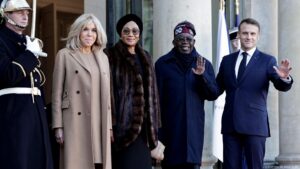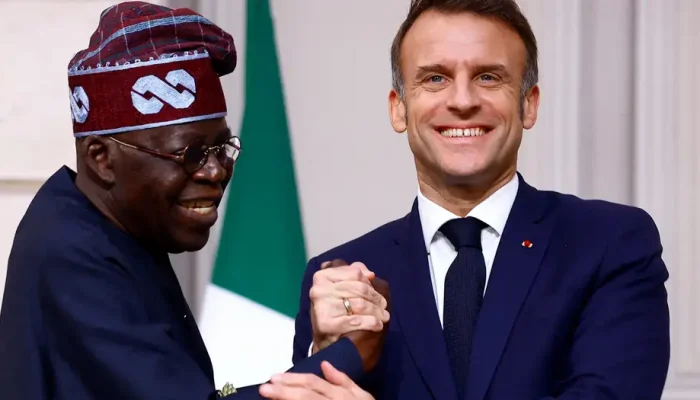The French President Emmanuel Macron welcomed Nigerian President Bola Tinubu to Paris for high-level talks aimed at deepening the economic and diplomatic partnership between their two nations. Following the meeting, President Tinubu declared, “Nigeria is open for business,” underscoring his administration’s commitment to fostering investment and economic growth in Africa’s largest economy.
This meeting marks an important chapter in the enduring relationship between Nigeria and France. As France’s top trading partner in sub-Saharan Africa, Nigeria plays a pivotal role in shaping the economic ties between Europe and the continent. For both leaders, the discussions presented an opportunity to address pressing economic issues, explore avenues for collaboration, and reinforce their commitment to shared growth in Africa’s largest economy.
 Macron and Tinubu with their wives.
Macron and Tinubu with their wives.
A Strategic Partnership in Trade and Investment
Nigeria and France enjoy a robust economic partnership, with trade serving as a cornerstone of their relationship. France is one of Nigeria’s largest foreign investors, with interests spanning energy, infrastructure, agriculture, and manufacturing. Nigeria, in turn, is a major exporter of oil, gas, and other commodities to France.
However, President Tinubu’s message during his visit was clear: Nigeria’s economy is diversifying, and the country is actively seeking investments in non-oil sectors. Tinubu highlighted sectors such as renewable energy, technology, and agriculture as ripe for foreign investment. By broadening its economic base, Nigeria aims to reduce its dependency on oil revenues, create jobs, and stimulate sustainable development.
For France, Nigeria’s 200-million-strong population represents a dynamic consumer market and a gateway to broader African trade. French companies have been steadily increasing their presence in Nigeria, with firms such as TotalEnergies, Air Liquide, and Danone already deeply embedded in the economy. Tinubu’s invitation to French investors reaffirms Nigeria’s commitment to fostering a business-friendly environment despite existing challenges such as infrastructure deficits and regulatory hurdles.
The Broader Diplomatic Agenda
Beyond economics, the talks also touched on regional security, climate change, and multilateral cooperation. Nigeria’s strategic importance extends beyond trade—it plays a leadership role in West Africa and across the continent. Macron, who has sought to reframe France’s engagement with Africa in recent years, sees Nigeria as a critical partner in addressing challenges such as terrorism, political instability, and economic inequality.
Security issues remain a priority for both nations. The Sahel region, which has been plagued by insurgencies, has a direct impact on Nigeria’s northern borders and France’s counterterrorism operations in Africa. Enhanced collaboration on intelligence-sharing, military training, and regional stability were likely on the agenda during Tinubu and Macron’s discussions.
Climate change is another area of mutual interest. France, a global advocate for climate action, and Nigeria, a country significantly impacted by climate change, both recognize the urgency of sustainable solutions. Their dialogue emphasized the need for investments in green technologies and climate-resilient infrastructure, which align with Nigeria’s broader development goals.
Economic Growth Amid Challenges
President Tinubu’s declaration that “Nigeria is open for business” reflects his administration’s ambition to restore investor confidence and position Nigeria as a key player in the global economy. His government has already made bold moves to address long-standing economic challenges, such as the removal of fuel subsidies and the unification of Nigeria’s exchange rates. These reforms, while difficult, are seen as necessary steps toward creating a stable and predictable business environment.
In Paris, Tinubu presented Nigeria as a country ready to embrace innovation and partnership. By courting French investors, he aims to bridge gaps in infrastructure, enhance industrial capacity, and create jobs. Macron’s willingness to host these discussions further highlights France’s interest in remaining a key partner for Nigeria’s economic transformation.
The Path Ahead
The meeting between Macron and Tinubu signals a renewed commitment to strengthening the partnership between France and Nigeria. For France, Nigeria is more than just a trading partner; it is a vital ally in Africa’s economic and geopolitical landscape. For Nigeria, France represents a valuable source of investment, expertise, and support in tackling the challenges of development.
As both nations look to the future, the emphasis will likely be on building a partnership that not only boosts trade but also fosters innovation, sustainability, and mutual prosperity. For Nigeria, being “open for business” is not just a slogan—it is a call to action for the world to recognize the potential of Africa’s largest economy.




